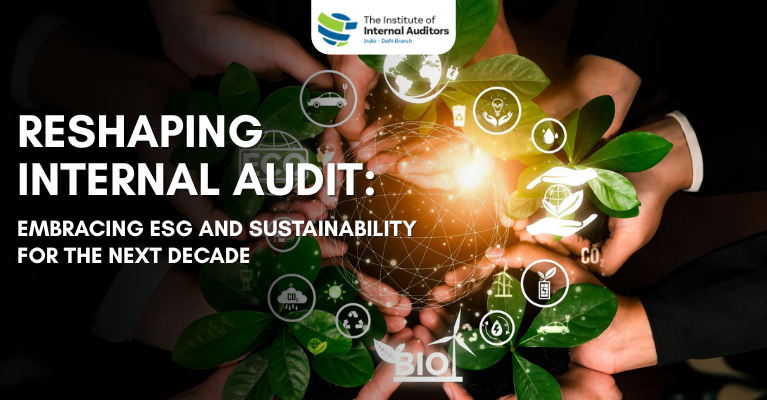Why ESG is the Salt, Not the Sweet, in Your Business Strategy
As we move into a transformative decade, Environmental, Social, and Governance (ESG) principles are no longer peripheral or optional. They are central to corporate resilience, reputation, and risk management.
In India, ESG has evolved rapidly, spurred by regulatory developments like SEBI’s Business Responsibility and Sustainability Reporting (BRSR) framework and India’s leadership in the G20 sustainable finance dialogues.
For internal auditors, this evolution signals a shift from being compliance verifiers to strategic advisors, ensuring that ESG principles are embedded deeply into business operations and long term growth.
Living ESG: How India Blends Purpose and Practice
Unlike Western models, which prioritise environmental concerns f irst, India’s ESG journey strongly emphasises social impact, from f inancial inclusion to healthcare access.
Examples across sectors include:
- Banking: Financing millions of rural households to drive financial inclusion.
- Healthcare: A long legacy of subsidised and free care offered by private and public trusts, helping bridge critical healthcare gaps in India.
- Agriculture and Construction: Startups innovating in sustainable farming, renewable energy, vertical gardens, and eco-friendly construction materials.
- Energy: Companies transitioning aggressively to clean energy, creating ripple effects across sectors.
- Manufacturing: A strong focus on sustainable materials and plastic recycling, reshaping production processes.
Case Study: Narayana Health’s Integrated ESG Journey
At Narayana Health, ESG is not an overlay but interwoven into our operational and strategic fabric. Recognising that true sustainability goes beyond environmental metrics, we have adopted a three-pronged approach:
- Environmental stewardship through initiatives like digital transformation (reducing paper usage) and renewable energy adoption, leading to measurable operational efficiencies.
- Strong governance practices that embed transparency, ethics, and risk management at the core of decision-making.
- Social impact integration, anchoring our sustainability journey to our founding mission, “Health for All,” through expansive doctor, nursing, and paramedic training programmes, and initiatives that make life-saving procedures accessible to all, regardless of financial means.
By aligning environmental, governance, and social objectives from the outset, Narayana Health exemplifies how ESG, when authentically integrated, drives organisational resilience, operational excellence, and societal good.
It’s Not All Green and Lush (Yet)
India’s ESG regulatory framework is evolving, but it remains fragmented. While the Securities and Exchange Board of India (SEBI) has mandated Business Responsibility and Sustainability Reporting (BRSR) for the top 1,000 listed companies, there is a lack of a unified, comprehensive ESG framework encompassing all sectors and company sizes. This fragmentation leads to inconsistencies in reporting standards and creates confusion among companies striving to align with ESG expectations.
Additional Challenges Persist:
- Low Disclosure Levels: While ESG reporting has improved, comprehensive disclosures — especially around Scope 3 emissions (indirect emissions across the value chain) — remain limited. This gap restricts stakeholders from fully understanding an organisation’s actual environmental footprint.
- Supply Chain Readiness: SMEs, that form the backbone of India’s supply chain, often lack the resources, awareness, or capabilities to track and report ESG metrics. This creates blind spots for large corporations trying to build end-to-end sustainable value chains.
- Risk of Greenwashing: As ESG reporting becomes more mainstream, there is an increasing risk of “greenwashing” — where companies focus more on optics than genuine impact. Superficial compliance without substantive action undermines stakeholder trust and threatens the credibility of ESG initiatives across the corporate sector.
Limited-Time Boarding: Why Internal Auditors Must Catch the ESG Bus Now
Across industries, ESG is still evolving. Organisations sit on a broad spectrum — from those treating ESG as a compliance checklist to pioneers weaving sustainability deeply into their strategy and culture.
T his transitional phase presents a limited window of opportunity for internal auditors.Those proactively developing new competencies can become trusted advisors guiding ESG integration, not just compliance enforcers — those who delay risk being relegated to afterthoughts in an ESG-driven future.
New Semester, New Skills: ESG Homework for Internal Auditors
To thrive in this changing landscape, internal auditors must build new competencies:
- ESG Literacy: Understand evolving standards (BRSR, ISSB, GRI) and sector-specific sustainability practices.
- Materiality Assessment Skills: Identify and prioritise ESG issues most critical to stakeholders.
- Data and Assurance Expertise: Validate non financial data with the same rigour as financial metrics.
- Strategic Thinking: Connect ESG initiatives to enterprise risk management, performance, and long-term value creation.
- Cultural Advocacy: Foster ESG values across operations, bridging the gap between policy and grassroots execution.
The future will belong to auditors who are not just compliance checkers, but architects of authentic ESG integration.
The bus is boarding — and the best seats are still available, but not for long.
Conclusion: ESG as a Strategic Advantage
The future of ESG in India and globally is clear:
- Board-level oversight of ESG will become a norm.
- Green financing will expand access to global capital at better terms.
- Stakeholder engagement will define corporate reputation across employees, suppliers, and customers.
The role of an internal audit will be pivotal, ensuring that organisations transition from performative ESG to purposeful ESG. As internal auditors, our challenge — and opportunity — is to lead this transition by ensuring compliance and championing authentic ESG integration that delivers value across f inancial, social, and environmental dimensions. It is time for internal auditors to help reshape organisations to survive and thrive in the next decade.
About the author:
Sandhya Sriram
Group CFO, Narayana Health
Sandhya.sriram2005@gmail.com
Sandhya Sriram is the Group CFO of Narayana Health, one of India’s leading healthcare groups, where she spearheads finance, ESG and governance initiatives. A chartered accountant and strategic finance leader, she brings two decades of global experience to Unilever, Wipro, and Narayana Health. Sandhya chairs Narayana Health’s ESG Committee, embedding sustainability into core business strategy, and has been recognised among India’s Top 100 CFOs. A regular speaker at national and international forums, she is passionate about driving business transformation, sustainability, and diversity in leadership.



